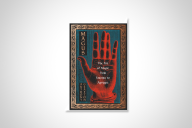You have /5 articles left.
Sign up for a free account or log in.
The title of Paul Goodman's Growing Up Absurd (1960) has taken on a life of its own -- mimicked or alluded to so often (e.g., Growing Up Amish, Growing Up Digital, and Growing Up Dead) that it seems familiar to people who not only haven't read the book, but have no idea there ever was one by that name. As for the subtitle, "Problems of Youth in Organized Society," it named one of the decisive questions of the decade that followed. One of the people interviewed in Jonathan Lee’s "Paul Goodman Changed My Life" -- a documentary released by Zeitgeist Films and screening around the country over the next couple of months -- recalls that for many years it was the one book found in every dormitory. Another says that you couldn't pick up a major magazine without finding Goodman mentioned, or as author of an article.
Within the limits of exaggeration-for-effect, that is actually a fair way to indicate how of a public presence the author had during the Kennedy administration, and he remained in great demand as a speaker, especially on campuses, for some while after that.
Goodman's political stance was unusual -- “anarcho-pacifist communitarianism” about covers it -- and certainly kept him on the sidelines during the 1950s. But his approach to social criticism was only occasionally that of declamatory denunciation. His approach, much of the time, was to make helpful suggestions toward the public good, in a spirit of responsible citizenship. Imagine the benefits of banning cars from Manhattan, for example, or ending the arms race immediately. Of course, trying to do most of the things he proposed would involve radical change, but so what? A famous piece of graffiti from the 1960s said "Be reasonable, demand the impossible." That might as well have been his slogan.
Goodman was anything but a one-book author, and social commentary was by no means his primary concern. The huge audiences he drew after Growing Up Absurd became a bestseller meant that publishers could not wait to re-issue his earlier work -- his novels and poetry, his University of Chicago dissertation on neo-Aristotelian literary criticism, his volume of psychoanalytic reflections on Kafka, you name it.
Ditto for anything new he wrote. Between 1960 and his death in 1972, he published three or four books a year. He was easily one of the best-known and most-read figures in the country, and "Paul Goodman Changed My Life" is an excellent tribute to his memory and reminder of his influence. It should go a long way toward generating more interest in him than has been evident over the last two or three decades -- when nobody, nobody at all, has been reading him.
An exaggeration for effect, of course. I've been reading him for most of that time, for one. Presumably a few other people have, as well. But still, close enough. Considering the scale of public response to Goodman’s work in final years of his life, the eclipse has been astonishing and all but total. The output of scholarly and critical literature on him has been thin in quantity -- and, for the most part, quality. The most important exception is Here Now Next: Paul Goodman and the Origins of Gestalt Therapy by Taylor Stoehr, a professor emeritus of English at the University of Massachusetts at Boston, who is Goodman's literary executor. It was published by Jossey-Bass in 1994, and is more far-ranging than the title may suggest. Before fame overtook him, Goodman was involved in a number of academic, psychoanalytic, artistic, and political circles, and Stoehr's monograph is the only attempt, so far, to chart some of his webs of influence and affiliation, at least to my knowledge.
And here is where Jonathan Lee’s documentary gives hope. It does an excellent job of evoking Goodman’s peripatetic and ramshackle career -- the stints teaching at Chicago and Black Mountain College, the years as a lay psychotherapist, the role he played with the off-Broadway Living Theater group, both as playwright and house philosopher. The composer Ned Rorem recounts setting his friend’s poems to music. We get a glimpse of how contemporary students respond to one of Goodman’s essays in a class taught the by adjunct English instructor Zeke Finkelstein at the City College of New York. And, best of all, there are numerous clips of Goodman being interviewed or speaking.
While not charismatic, exactly, he is certainly fearless, an admirable quality in an intellectual and particularly valuable for its scarcity. The interview on William F. Buckley's show "Firing Line" in 1966 is a case in point. The documentary begins with Buckley introducing his guest as “a pacifist, a bisexualist, a poverty cultist, an anarchist, and a few other distracting things.” Before responding to Buckley’s first question, Goodman objects to how he has been described. “I’m not a poverty cultist," he says. "I do think it's a sign of a good society that it is possible to live in decent poverty, especially if you so choose, that is, if you have more important things to do than to make money.” (He goes on to correct Buckley for misusing the word “axiomatic,” as the host concedes.) But what Goodman doesn’t respond to at all -- noticeably enough -- is the reference to his sexuality. He was candid about it to the point of losing at least a couple of teaching positions. It also got him beaten up.
Goodman could be prickly, egocentric, and not shy about communicating the assumption that he was a genius. Plus he made passes at everybody. He must have been difficult company at times. Some of this comes through in the documentary, and it serves as needed balance to any hagiographic impulse. On the other hand, there was never a valid criticism of Goodman that he hadn't made about himself in a poem or essay somewhere.
The film ends with a suggestion that Goodman's influence and example might revive. Fair enough: some of his work has been reprinted of late, and The Paul Goodman Reader, edited by Stoehr and published by PM Press, is a representative sampling of his work in several fields and genres.
But the possibility of a revival does not explain why his influence and example waned in the first place. During an e-mail discussion with Lee, I asked him why he thought Goodman's star had faded. One thing the director stressed is that Goodman “wasn't a specialist,and therefore did not become a star in any specific academic discipline. His brother Percival told me that if he had written only in one discipline, he would have become famous as an author in that discipline, say psychology, for example, and there would have been an academic constituency to carry him forward.”
At the same time Goodman’s work “is more intellectual, more rationalist, than say a Jack Kerouac, whose [On the Road] is in print. Paul Goodman challenges the reader to think, to act, and reading him is not a dumbed-down experience. I think that we've been continuing a dumbing-down of our public life -- certainly what's available and popular in the mainstream media -- and Goodman is too smart to satisfy the demand for easy, non-challenging material.”
Valid points, as far as they go, though they don’t exhaust the question. Not all of the failings are on the side of the public. The range of subjects in Goodman’s work is great, but so is the range of quality. You have to read a great deal of his work to see how parts of it hold together. He seems to have cobbled together a kind of intellectual framework from elements of Aristotle, Kant, Freud, Dewey, and Kropotkin -- an interesting list, but a slightly odd one. And Susan Sontag’s description of Goodman’s prose is exactly right: “What he wrote was a nervy mixture of syntactical stiffness and verbal felicity; he was capable of writing sentences of a wonderful purity of style and vivacity of language, and also capable of writing so sloppily and clumsily that one imagined he must be doing it on purpose.” (Then again, only a mediocrity is always at his best.)
But there is a passage from the introduction to his book Utopian Essays and Practical Proposals (Random House, 1962) in which Goodman explains himself as clearly anyone could want, and with a kind of eloquence.
“As my books and essays have appeared," Goodman wrote, "I have been been severely criticized as an ignorant man who spreads himself thin on a wide variety of subjects, on sociology and psychology, urbanism and technology, education, literature, esthetics, and ethics. It is true that I don't know much, but it is false that I write about many subjects. I have only one, the human beings I know in their man-made scene. I do not observe that people are in fact subdivided in ways to be conveniently treated by the ‘wide variety’ of separate disciplines. If you talk separately about their group behavior or their individual behavior, their environment or their characters, their practicality or their sensibility, you lose what you are talking about. We are often forced, for analytic purposes, to study a problem under various departments — since everybody can't discuss everything at once, but woe if one then plans for people in these various departments! One will never create a community, and will destroy such community as exists.... I make the choice of what used to be called a Man of Letters, one who relies on the peculiar activity of authorship -- a blending of memory, observation, criticism, reasoning, imagination, and reconstruction -- in order to treat the objects in the world concretely and centrally.”
There are worse models of intellectual activity than this, and Jonathan Lee has done a useful thing by reminding us what it looked like in person.








